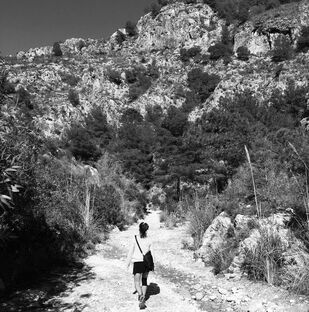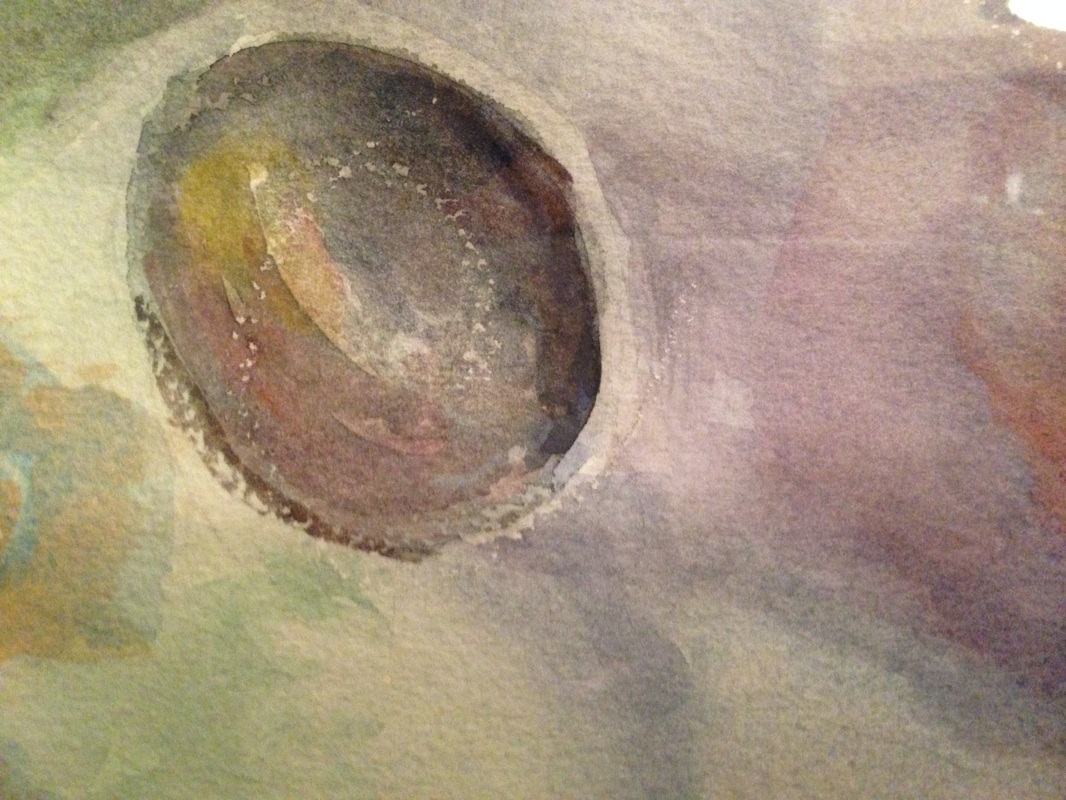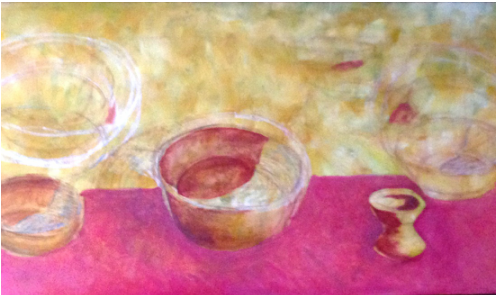|
I came home tired and happy after an evening of dance practice. Before turning in for the night, I did a fast bit of iPhone research to track down country songs to play for a waltz in my next class. The words on the phone screen blurred and I couldn't quite read the song titles.
When I still couldn't read the song titles, I said to myself, "my eyes must be tired, maybe I need new glasses, something is wrong with the screen." I turned off the phone, believing the screen's bright white light wasn't good for me. Within a few seconds I saw trails of white and green light, in a zig-zag, cross- hatch formation, across the upper wall of my room. I went to emergency, at the General. The diagnosis: aura without migraine. It turns out this is quite common. In my case, a wicked migraine surfaced a day later. I had pounding behind my eyes, a throbbing head, and root-canal like pain in my mouth. My aura without migraine, followed by a full-on migraine, gave me a chance to chew on two ideas that go far beyond this experience:
Pain is coloured by what we believe about the pain The way we perceive and think about our pain influences our experience of pain. The way we interpret the pain can make the symptoms even worse.
Yes, I coped better when I could:
And I must admit a stronger medication was a godsend. To deny, refuse and reject When we directly experience something as not quite right, or when we perceive something or someone as not quite right, the feelings can be uncomfortable. It is quite natural to deny, reject or even refuse to believe a given experience or perception that is in fact the real thing.
In my case, it didn't take me long to realize that blurry vision and flashing lights were signals that things were not quite right. But I could see how in other circumstances my mind could easily play tricks on me. This can be a problem if we:
Blurry and pain-free, Coach Minda
9 Comments
For 25 years this painting has hung on the wall in my dining room. From time to time, I stop and look at it with admiration. I challenge myself to answer "why do you love this painting," at least once a year. I always come back with the same answer. Above and beyond its colors (truly superior to what my iPhone captured above), brushwork and sheer size - over six feet across - this painting is to my eye both perfectly complete and a work in progress. It conjures up positive feelings and thoughts associated with:
Waystations, masterpieces and tradeoffs The metaphor of art, life or a task as a work in progress is nothing new. What interests me is the hope - or more the belief - that we can enjoy ourselves as we move along the continuum from rough sketch to final product. Unfinished is often a waystation on the way to the final destination.
Perfectionists often stop themselves from doing things unless they can get them exactly right. They often see unfinished or imperfect as a failure. But they do dream of, and sometimes create, masterpieces. On the other hand, others have a high tolerance for not needing things to be perfect, and can be perfectly satisfied with making something as good as it can be given the time or energy available for the task at hand. I call this making a tradeoff. And the most perfect scenario is someone with a high degree of perfectionism and a well developed sense of getting it done. Progressing, Coach Minda If you want to accomplish something new in art, life or task, set up a coaching session with me, Coach Minda (514-791-4506). My clients include artists, professionals and business people and many face the same challenges of completing works in progress. A wall-sized map of the world animated my childhood kitchens in Edmonton, Winnipeg, New York and Montreal. Geography was a favorite family game. We had vacations in Rome and London in the 1960s. I grew up seeing travel as a source of fun, adventure and escape. The lure of travel is often accompanied by a hope. A hope for change, for personal metamorphosis and for discovering a more inspiring version of ourselves. A hope for something and someone new and improved. At the very least, a change from our routines. The lure of the road Recently my brother’s family took a road trip in Arizona and Utah. Their photos were amazing, so now I want to take the same kind of trip. I want a great adventure with incredible scenery. There’s just one hitch: I can't stand sitting in a car for hours each day. The inactivity is counter to my nature. My back aches just thinking about it. I also worry about "unhealthy" roadside meals and bad beds in airless motel rooms. I fear a road trip will bring on bouts of the restlessness and worry that travel is designed to conquer. It's a real shame. Because being on the road means experiences and people of the unexpected and unforgettable variety. All this captivates my imagination, especially in deepest February. How to hit the road without leaving your street All my travels to date have taught me that, once the trip is over, we are back to where we started. So how can we capture the transformative feeling of travel – the adventure, the unexpected, the new – without taking a trip?
I have a few ideas on the subject:
Hit the road, Coach Minda |
My family, relationships, movement, nature, flexibility of mind, exploration of alternative perspectives & openness are central to my life.Archives
December 2021
|
Private and confidential
|
Connect with me
|





